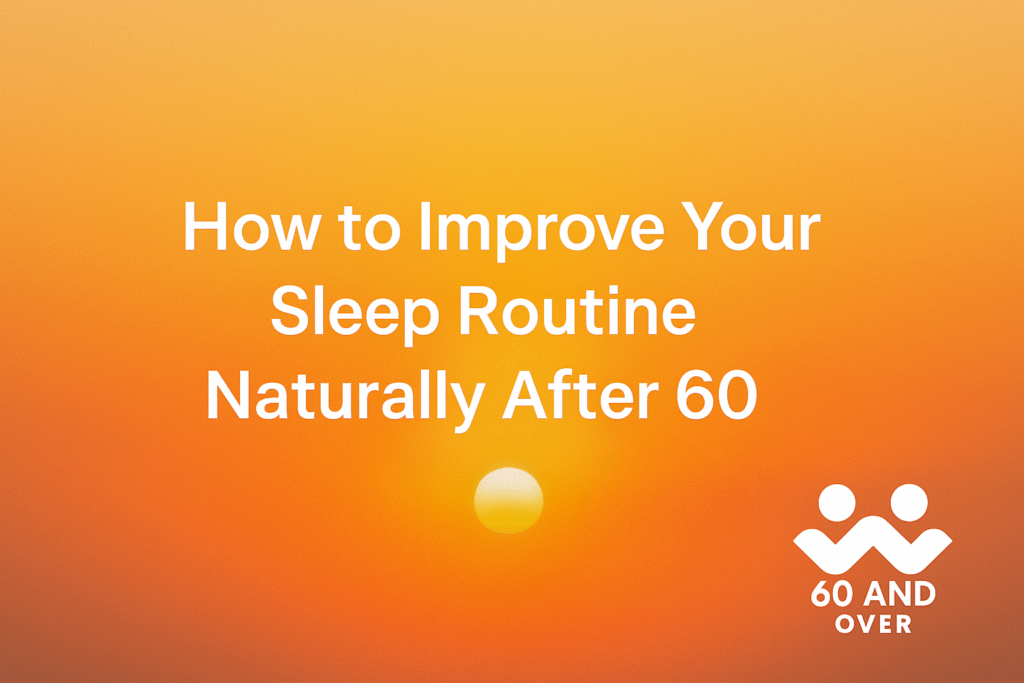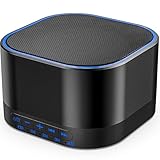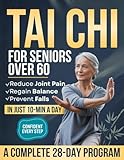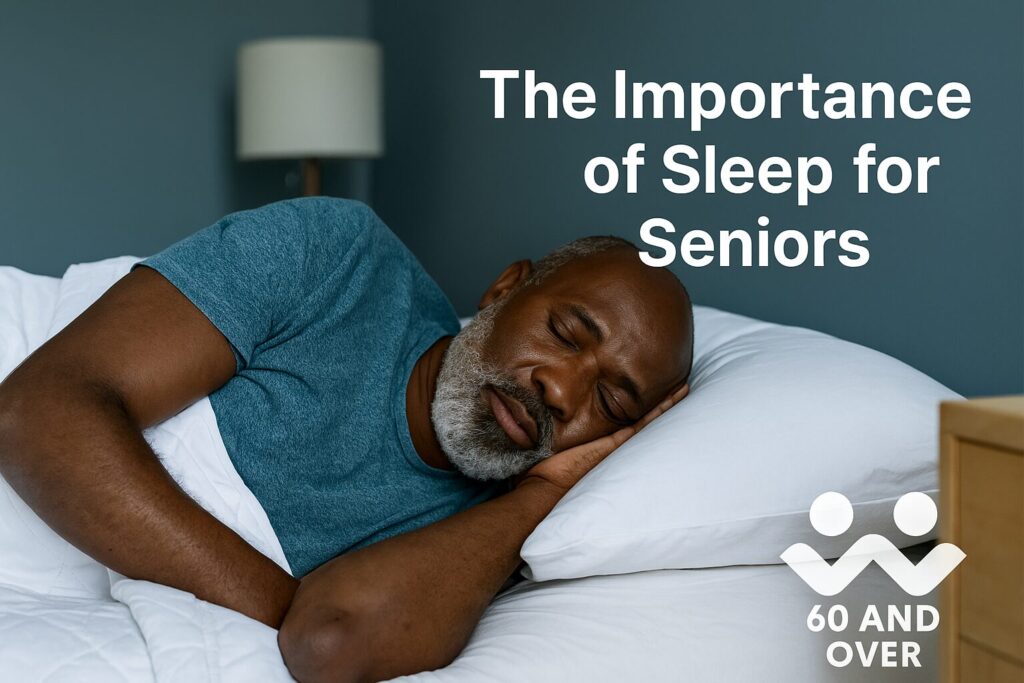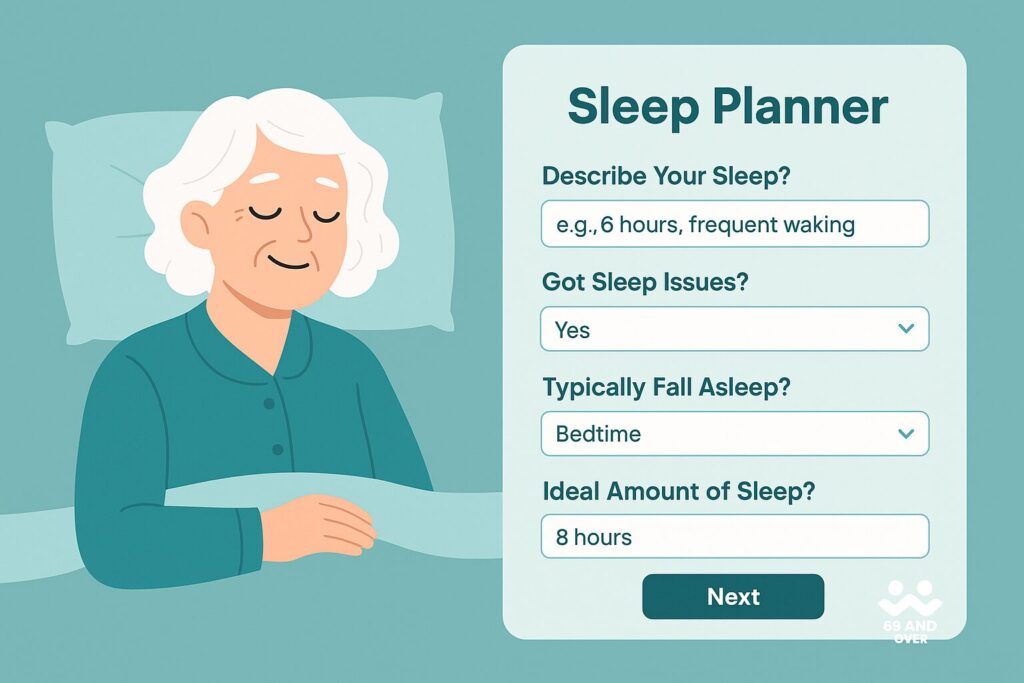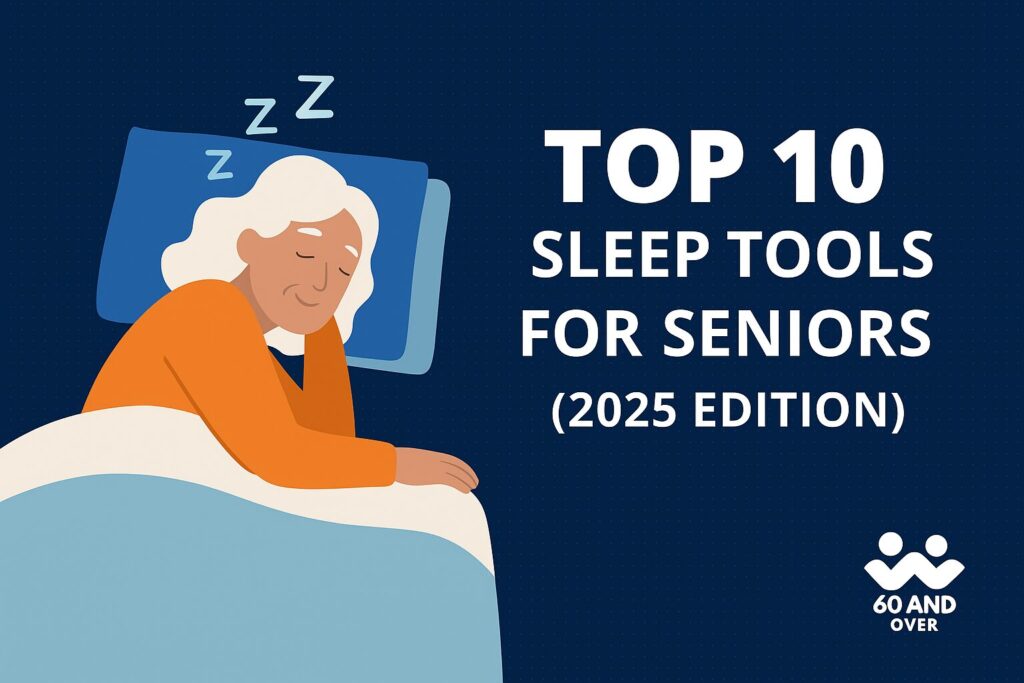Why Sleep Changes After 60
Many older adults notice that their sleep patterns shift over time. You might fall asleep earlier, wake up during the night, or feel tired even after a full night in bed. This is completely normal — the body’s internal clock (known as the circadian rhythm) naturally changes with age.
The good news? You can improve your sleep quality without medication by adjusting simple daily habits. These gentle, natural strategies help you fall asleep faster, stay asleep longer, and wake up feeling genuinely refreshed.
1. Reset Your Internal Clock with Light
Light is the most powerful signal to your body’s internal clock. Research from the National Institutes of Health shows that exposure to morning light helps regulate melatonin and supports healthier sleep patterns.
Start each day by opening the curtains, stepping outside, or sitting near a sunny window for at least 15–30 minutes. If mornings are dark or cloudy, a sunrise alarm clock can gently simulate dawn and cue your body to wake up naturally.
For example, the Lumie Bodyclock Shine 300 offers gradual sunrise and sunset modes that help you wake up calmly instead of abruptly. You can learn more in our full guide:
👉 Best Sunrise Alarm Clocks for Seniors in 2025
- THE BEST WAY TO WAKE UP: Wake up naturally with sunrise for better mood, energy and motivation
- PERSONALIZED SUNRISE/SUNSET: 15-90 minute sunset/sunrise duration, a choice of 15 sleep/wake sounds or FM radio
- OPTIMIZED FOR SLEEP: LEDs with reduced-blue light content help create an environment where sleep comes easily
- BETTER SLEEP HYGIENE: Establish a healthy screen-free evening routine and fall asleep easier with a fading sunset
2. Create a Predictable Evening Routine
Routine is key to great sleep. Your brain loves consistency — especially when it comes to bedtime signals. The Sleep Foundation recommends keeping consistent sleep and wake times to help regulate your internal clock.
Aim to go to bed and wake up at the same time every day, even on weekends. About an hour before bedtime, begin a relaxing sequence that tells your body it’s time to wind down. Try reading, listening to soft instrumental music, or doing gentle stretches.
Avoid screens during this time. The blue light from TVs, tablets, and phones delays melatonin release and keeps your mind alert. If you must use a device, turn on “night mode” or use blue-light-filter glasses.
3. Set the Scene for Restful Sleep
Your environment can make or break your rest. A few small adjustments can make a big difference:
- Temperature: Keep your bedroom cool — ideally around 65–70°F.
- Lighting: Use a dim lamp or a sunset-mode light in the evening.
- Sound: Gentle white noise, ocean sounds, or soft classical music can mask background noise.
- Bedding: Choose breathable fabrics like cotton or bamboo and make sure your mattress supports your preferred sleep position.
If you share a bed, consider separate blankets or a weighted blanket for comfort and warmth balance.
- ❤20 Non-Looping Sleep Sounds: White noise ,Brown noise, pink noise, blue noise, fan,brook, rain, ocean,bird and…
- ❤Precise Volume & Timer Settings:With 32 Levels of Volume ,it is perfect for baby sleeping .And you can set 1 hour,2…
- ❤Unique Design: Solid-state design with 3.01inch*3.01inch *1.77inch,it is portable for home, office or travel,can give…
- ❤Function & Safety:Memory function automatically restores your previous volume, sound and time,it is powered by AC or…
4. Be Mindful About Food and Drink
What and when you eat can affect how well you sleep.
- Avoid caffeine after noon (it can stay in your system for up to 8 hours).
- Limit alcohol, which may help you fall asleep faster but disrupts deep sleep later.
- Have a light dinner that includes foods rich in magnesium or tryptophan — like bananas, spinach, almonds, or turkey.
- Stay hydrated throughout the day but reduce liquids two hours before bed to prevent nighttime bathroom trips.
A cup of herbal tea such as chamomile or valerian root about 30 minutes before bed can also calm the mind.
- ORGANIC: WE packed these flowers in DOA (Department Of Agriculture) of Ohio certified facility. 100% certified organic…
- A LOT OF FLOWERS: 1lb of chamomile flowers is sufficient quantity to make your own CHAMOMILE ESSENTIAL OIL! Flowers…
- EASY: Each order comes in a 1 lb bulk bag made with BPA free multi-layer polymer and paper surface. The bag is free…
- SOURCING: We have had out own representative to travel to Egypt and personally meet the farmers, processors and…
5. Move Gently During the Day
Regular physical activity improves sleep quality and helps regulate your internal clock. You don’t need a gym — even a 15-minute walk after breakfast or dinner helps.
Consider chair yoga, tai chi, or water aerobics if you prefer low-impact options. The key is to move consistently — your body will reward you with deeper, more restorative sleep.
Just remember: avoid vigorous exercise within three hours of bedtime. Too much stimulation too close to sleep can make it harder to unwind.
- S. Chen, David (Author)
- English (Publication Language)
- 112 Pages – 08/31/2025 (Publication Date) – Independently published (Publisher)
6. Relaxation Before Bed
If your mind tends to race at night, add a relaxation ritual before turning in.
Try this simple 4-7-8 breathing exercise:
- Inhale through your nose for 4 seconds.
- Hold your breath for 7 seconds.
- Exhale slowly through your mouth for 8 seconds.
Repeat four times.
Other great relaxation habits:
- Gentle bedtime yoga or stretching
- Listening to guided meditations or sleep stories
- Using aromatherapy — such as lavender or eucalyptus oils
You can explore more about calming scents and diffusers here:
👉 Easy-to-Use Lavender Diffuser Kit for Adults 60 and Over
- 5-IN-1 AROMATHERAPY DEVICE: This ultrasonic essential oil diffuser is an amazing multi-functional aromatherapy device…
- ULTRA-QUIET FAN: With the upgraded ultra-quiet fan, the diffuser is quieter than ever. The noise level is lower than 23…
- CONVENIENT REMOTE CONTROL: Our diffuser comes with an easy to use remote control that can control it from up to…
- PERFECT FOR DIFFERENT OCCASIONS: The mist and light functions of this aromatherapy diffuser work separately. You can…
7. Manage Stress and Worry
Mental clutter is one of the biggest sleep disruptors after 60. Anxiety, to-do lists, or health worries can keep your brain active long after your head hits the pillow.
Try writing your thoughts down before bed. Keep a small notebook on your nightstand — it’s amazing how freeing it feels to “put things on paper.”
Another simple strategy is gratitude journaling: each night, jot down three things you’re thankful for. Studies show it lowers stress and promotes positive thoughts before sleep.
If stress feels unmanageable, don’t hesitate to talk with a counselor or healthcare provider. Mental wellness is a key part of healthy sleep.
8. Natural Sleep Aids to Support Your Routine
While habits form the foundation, a few natural aids can enhance your sleep environment:
- Herbal teas like chamomile, passionflower, or valerian root
- Magnesium glycinate supplements (with your doctor’s approval)
- Weighted blankets for calming pressure
- Lavender diffusers or pillow sprays
- Melatonin — short-term use can help reset your internal clock, but it’s best discussed with your physician
Avoid dependency on over-the-counter sleep medications unless prescribed. Natural aids work best when paired with consistent sleep hygiene.
- 🌙【CHOOSE RIGHT WEIGHT】: Weighted blanket which owns 7%- 10% of your body weight is recommended. For example, a…
- 🌙【JUST ON TOP OF MATTRESS】: Yescool weighted blankets for adults keep you sleeping all night. We recommend a…
- 🌙【TIGHTLY STITCHING&DURABILE】: Our weighted blanket for women&man composed of 5″x5″ small enough compartments…
- 🌙【MACHINE WASHABLE】: The weighted blankets for adults 20 lbs can be machine-washable in cold water on the gentle…
9. When to Seek Medical Advice
If you consistently struggle to fall asleep or stay asleep — despite good habits — consult your doctor. Conditions such as sleep apnea, restless legs syndrome, or medication side effects can all interfere with rest.
Watch for signs like loud snoring, gasping during sleep, or extreme daytime fatigue. These may require professional evaluation or a CPAP device. You can learn more here:
👉 Best CPAP Machines for Seniors in 2025
- Remstar Plus Cpap System is a CPAP (Continuous Positive Airway Pressure) device designed for the treatment of adult…
- CAUTION:Do not overfill the water tank as water may enter the device and air tubing.
- Packing list of the device:Device with integrated humidifier and water tank,Power supply unit ,Travel…
- Make sure that the water tank is empty before transporting the device.When use the machine, please always place the…
10. Building the Perfect Sleep Routine — One Step at a Time
You don’t need to overhaul your nights in one go. Start small — go to bed 15 minutes earlier, dim the lights after dinner, or replace your phone scroll with a good book. Each small change sends a clear signal to your body: it’s time to rest.
Most importantly, stay consistent. A steady routine is the foundation of healthy sleep — and your energy, memory, and mood will thank you for it.
💤 Final Thoughts
Improving your sleep after 60 isn’t about sleeping more — it’s about sleeping better.
With the right rhythm, light exposure, and relaxation habits, your nights can feel calm, steady, and deeply restorative again.
Small, natural changes often work better than any pill. Start tonight with one: turn off the TV, lower the lights, and let your body ease naturally into sleep.
🧠 More Helpful Reads
- Best Sunrise Alarm Clocks for Seniors in 2025
- Best Sleep Aids for Seniors Over 70
- Best CPAP Machines for Seniors in 2025
🩵 Friendly Note
This guide shares general wellness information and is not a substitute for professional medical advice. Always consult your healthcare provider before adding new supplements or changing your sleep treatment plan.
Your well-being matters — and at 60AndOver.net, our goal is to help you sleep soundly, naturally, and safely.
Frequently Asked Questions: How to Improve Your Sleep Routine Naturally After 60
1. Why does sleep become more difficult after 60?
As we grow older, our internal body clock (circadian rhythm) shifts and produces less melatonin — the hormone that helps regulate sleep. Medical conditions, medications, or lifestyle habits can also affect sleep quality.
2. What are natural ways to fall asleep faster after 60?
Stick to a consistent bedtime, avoid screens an hour before sleep, and create a relaxing wind-down routine. Gentle stretching, herbal tea, and dim lighting help signal your body that it’s time to rest.
3. Are afternoon naps bad for seniors?
Short naps of 20–30 minutes can boost energy without disturbing nighttime sleep. However, longer or late-day naps may make it harder to fall asleep at night.
4. What temperature should my bedroom be for better sleep?
Most experts recommend 65–70°F (18–21°C). Cooler air encourages the body’s natural drop in core temperature, helping you fall asleep faster and stay asleep longer.
5. Can natural supplements really help with senior sleep?
Some people benefit from gentle, doctor-approved options like magnesium glycinate, melatonin, or herbal teas such as chamomile and valerian. Always consult your healthcare provider before adding supplements.
6. How does light exposure affect senior sleep?
Morning sunlight or sunrise-style alarm clocks help reset your internal clock, while dim evening light encourages melatonin release. Avoid bright screens before bed for the best results.
7. When should I talk to my doctor about sleep problems?
If you regularly struggle to fall or stay asleep for more than 3 nights a week — or if you wake feeling unrefreshed — speak with your doctor. Sleep apnea, medication effects, or other medical issues may be involved.
🧠 Friendly Tip
Consistency and comfort are key. Combine light exposure, gentle activity, and calming nighttime habits for lasting improvements — without relying on sleep medications.

